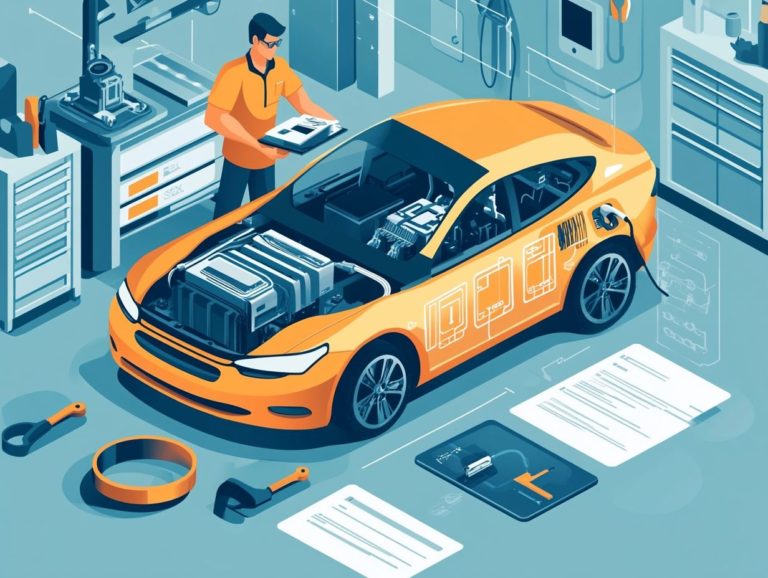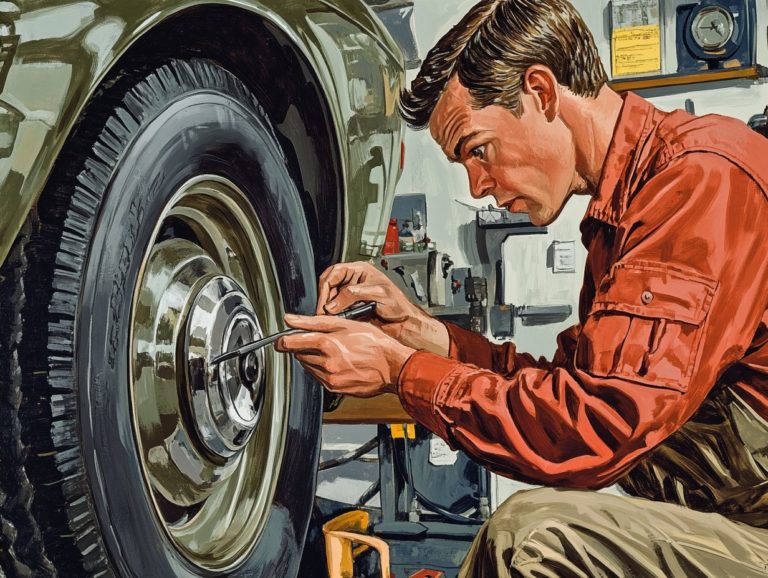How to Maintain a Car with High Mileage
High mileage cars can offer incredible value, yet they bring their own unique set of challenges. Understanding what classifies a vehicle as high mileage is just the starting point for you.
This guide reveals crucial signs of wear and tear you can’t afford to ignore! From maintaining vital fluids and lubricants to replacing worn-out components, you’ll uncover essential tips for ensuring your high mileage car continues to run smoothly.
Discover the best driving habits and maintenance practices that can significantly extend your vehicle’s lifespan. Whether you’re a seasoned car owner or just beginning your journey, this guide will arm you with the knowledge needed to keep your high mileage car in pristine condition.
Contents
- Key Takeaways:
- Signs of Wear and Tear in High Mileage Cars
- Maintaining Fluids and Lubricants
- Replacing Worn-Out Parts
- Proper Driving Habits for High Mileage Cars
- Regular Maintenance for High Mileage Cars
- Frequently Asked Questions
- What is considered high mileage for a car?
- How often should I change the oil in a high mileage car?
- What other fluids should I regularly check and change in a high mileage car?
- How can I prevent wear and tear on my high mileage car?
- Should I use synthetic or conventional oil in a high mileage car?
- Is it worth investing in a high mileage car?
Key Takeaways:
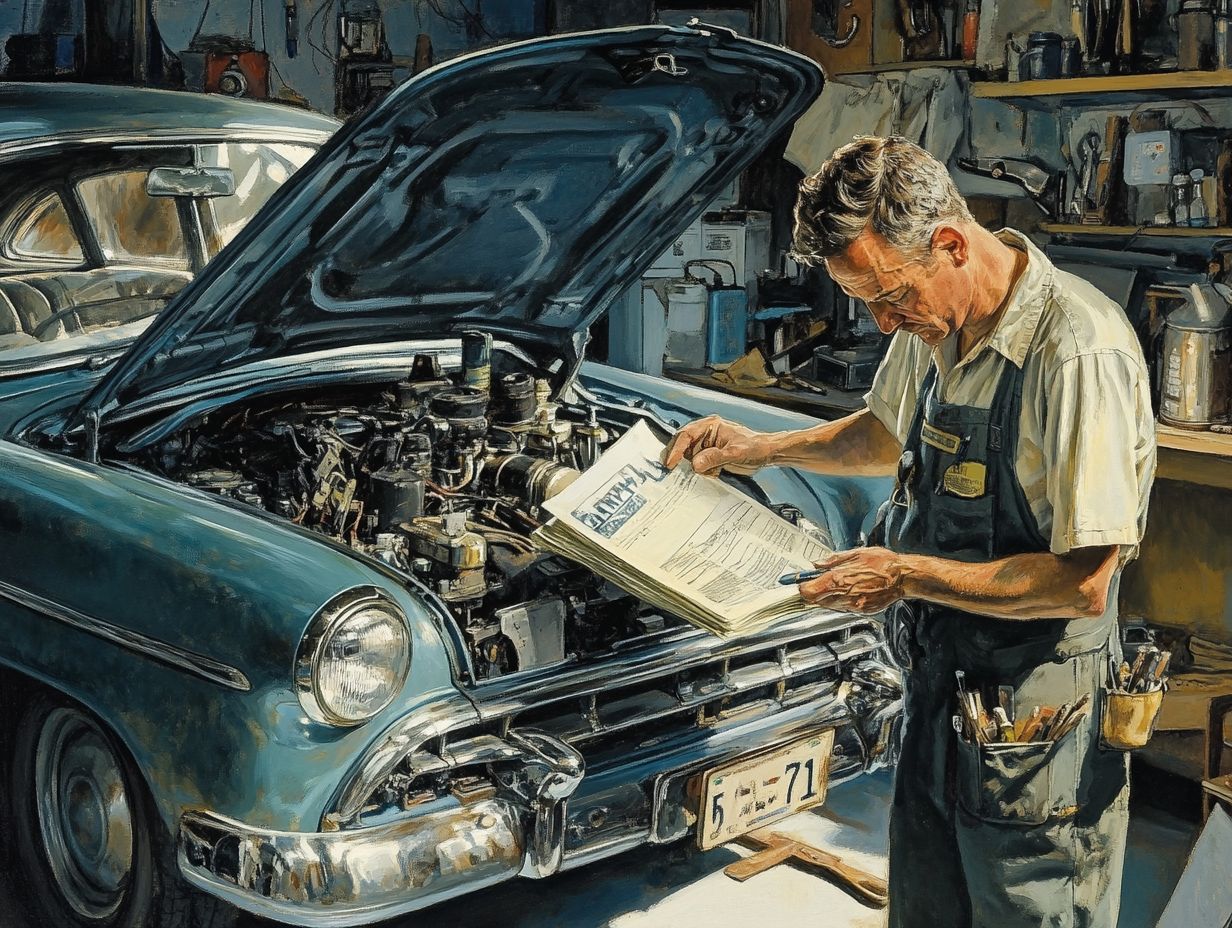
- Regularly check and maintain fluids and lubricants to prevent damage and prolong the lifespan of a high mileage car.
- Identifying and replacing worn-out parts is crucial in preventing further damage and ensuring the safety and reliability of a high mileage car.
- Practicing proper driving habits and following recommended service intervals can greatly extend the life of a high mileage car.
What Constitutes a High Mileage Car?
A high mileage car is generally considered one that has surpassed the 100,000-mile mark, like a Chevrolet Prizm produced at NUMMI. Such vehicles may begin to show a range of issues stemming from wear and tear.
As an owner, you might encounter challenges related to maintenance, performance, and reliability as the engine and various components start to exhibit signs of fatigue. When determining what qualifies as high mileage, several factors come into play, including the vehicle s age, overall condition, and the level of care it has received.
For instance, while your Chevrolet Prizm might cross that 100,000-mile threshold, you could see signs of engine trouble emerge sooner if routine inspections and oil changes are overlooked. Increased wear and tear can lead to more frequent engine issues and significant repairs, highlighting the critical importance of a regular maintenance plan.
By committing to regular fluid checks, timely replacements, and thorough inspections, you can dramatically lessen the chances of unexpected breakdowns. This ensures that your high mileage car continues to perform reliably and serve you well.
Signs of Wear and Tear in High Mileage Cars
High mileage cars frequently show signs of wear and tear that can lead to performance issues. You might notice engine hesitation, strange noises, or a decline in fuel efficiency. This underscores the importance of regular fluid checks and maintenance to keep your vehicle in optimal condition.
Taking proactive steps ensures your car remains reliable and performs at its best.
Common Issues and Red Flags
High-mileage cars often show common issues. These include persistent engine troubles, suspension concerns, and the pressing need for tire maintenance, all of which can significantly impact safety and performance.
You may start to notice unusual noises coming from the engine, like knocking or ticking, which could indicate wear or insufficient oil levels. Suspension problems might reveal themselves through a bumpy ride or questionable handling, hinting at worn shock absorbers or struts.
Tire maintenance becomes increasingly crucial, as uneven wear can lead to handling difficulties and longer stopping distances. Recognizing these symptoms early is essential; ignoring them could result in serious and costly repairs later on.
Being proactive helps you extend the life of your vehicle and ensure a safer and more enjoyable driving experience.
Maintaining Fluids and Lubricants
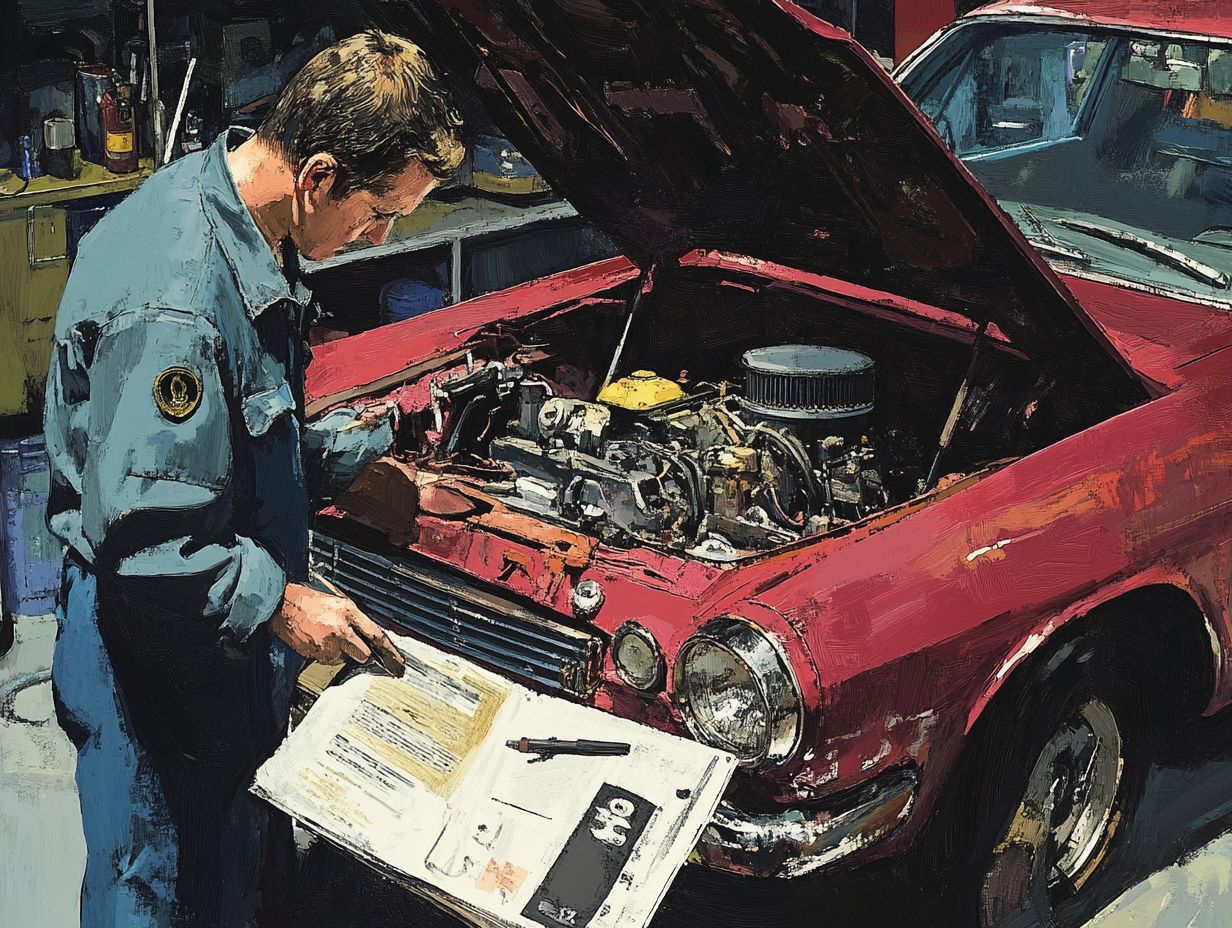
Maintaining fluids and lubricants in a high-mileage car is essential. Regular oil changes, coolant replacements, and complete fluid checks including brake fluid and transmission fluid are key practices that not only enhance performance but also extend the life of your vehicle.
By prioritizing these routine maintenance tasks, you can ensure that your car runs smoothly and remains reliable for years to come.
Importance of Regular Changes and Top-Offs
Regularly changing and topping off essential fluids like oil, brake fluid, and coolant is crucial for vehicle maintenance. This practice safeguards against engine issues and ensures that your vehicle runs smoothly.
By adhering to a consistent schedule for these vital fluid updates, you can significantly reduce the chances of unexpected breakdowns while improving your vehicle s overall performance. For instance, oil changes lubricate the engine s moving parts, minimizing wear and tear over time.
Keeping brake fluid at optimal levels not only enhances braking efficiency but also dramatically improves safety on the road. Proper coolant levels prevent the engine from overheating, which can lead to costly repairs.
In essence, adopting these maintenance habits is a savvy strategy for prolonging your vehicle’s lifespan.
Replacing Worn-Out Parts
Replacing worn-out parts like the serpentine belt, fuel filter, and spark plugs is vital for maintaining a high-mileage vehicle. Neglecting these components can lead to serious engine performance issues and further complications down the line.
Prioritizing this maintenance not only boosts your car s reliability but also protects your investment for the long haul.
Identifying and Addressing Wear and Tear
Identifying and addressing wear and tear is essential for ensuring the longevity of your high-mileage car. This involves evaluating key systems like the suspension and using special products to help the engine run better.
Paying attention to changes in handling, unusual noises, or vibrations can provide crucial insights into potential problems. Regular checks of fluids, tire tread depth, and brake components should all be integral to your vehicle maintenance checklist.
Maintaining a record of all services performed creates a tangible history of care, allowing for quicker diagnosis of issues when they arise. Timely interventions boost performance and ensure your safety on the road, preventing minor issues from escalating into costly repairs.
Ultimately, these regular assessments reflect your commitment to both your vehicle’s reliability and your own peace of mind.
Proper Driving Habits for High Mileage Cars
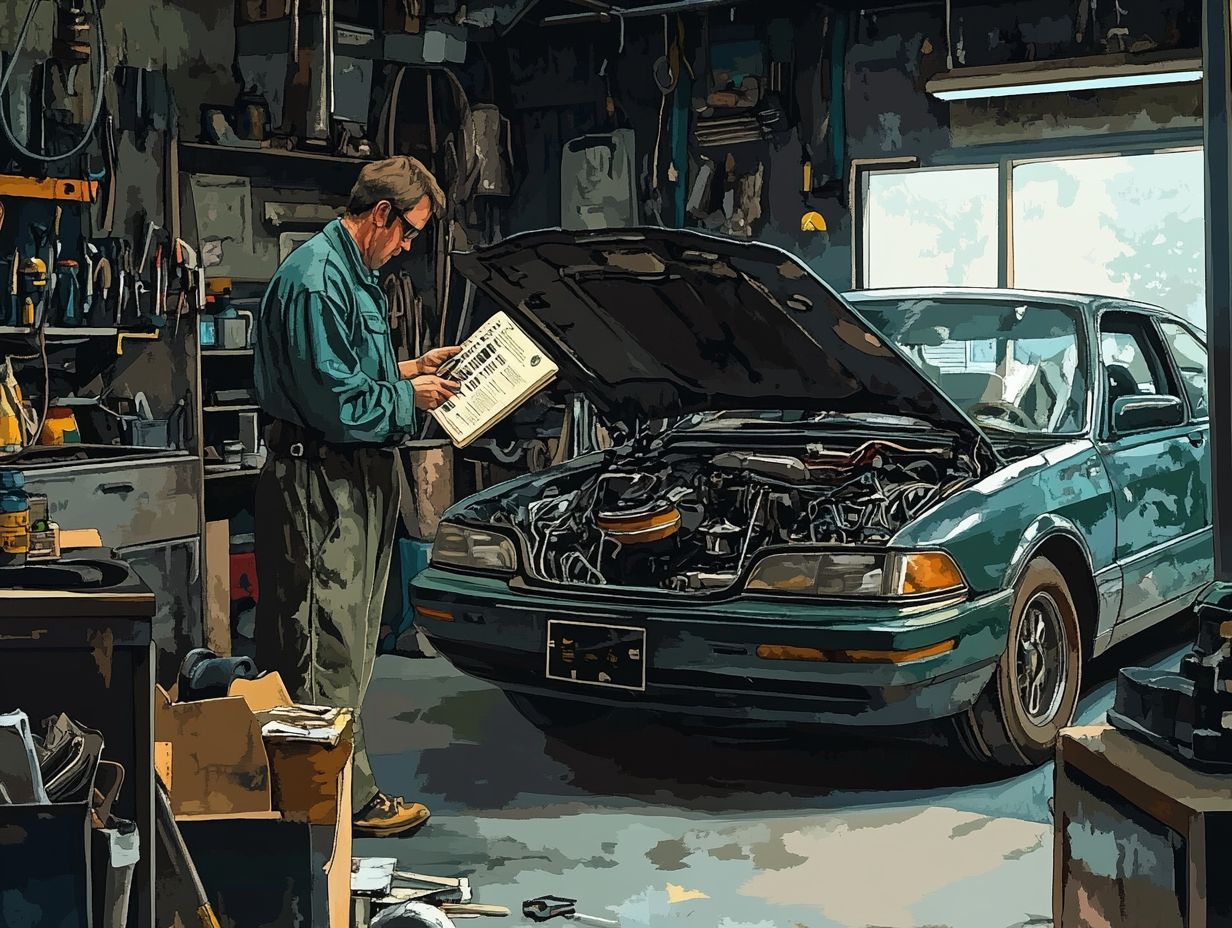
Proper driving habits significantly impact the performance and longevity of high-mileage cars. By adopting gentle driving techniques, you can minimize wear and tear on essential components like the fuel system and engine, thus reducing the likelihood of future performance issues.
Tips for Extending the Life of Your Car
- Regularly inspect key components like the engine, brakes, and tires to catch small issues before they become costly repairs.
- Follow the manufacturer s maintenance schedule to ensure timely oil changes, fluid checks, and filter replacements.
- Be vigilant for signs of wear or unusual noises to diagnose problems early.
By adopting these proactive measures, you will enhance your vehicle s longevity while improving safety and the overall driving experience. This way, you can truly get the most out of every mile traveled.
Regular Maintenance for High Mileage Cars
Regular maintenance for your high-mileage car is essential. By adhering to service intervals and following a comprehensive checklist, you can identify potential issues early.
This proactive approach not only protects your investment but also enhances your vehicle’s reliability for the long haul. Start your maintenance checklist today to keep your car running smoothly!
Recommended Service Intervals and Checks
Following recommended service intervals and conducting routine checks on critical systems, like fluid levels and tire maintenance, is essential for keeping your high-mileage car in peak condition. For more detailed advice, you can explore the top 10 car maintenance tips for longevity.
Without regular inspections, key components can gradually wear down. If you let that slide, you could face costly repairs or even find yourself in unsafe driving conditions. As a car owner, you need to stay informed about when to change your engine oil, replace air filters, and inspect brake pads. These tasks significantly impact your vehicle s overall performance and longevity.
Overlooking coolant levels or tire pressure can lead to decreased fuel efficiency and unexpected breakdowns. By taking a proactive approach to maintenance, you can ensure that your vehicle remains reliable, comfortable, and safe on the road for years to come.
Frequently Asked Questions
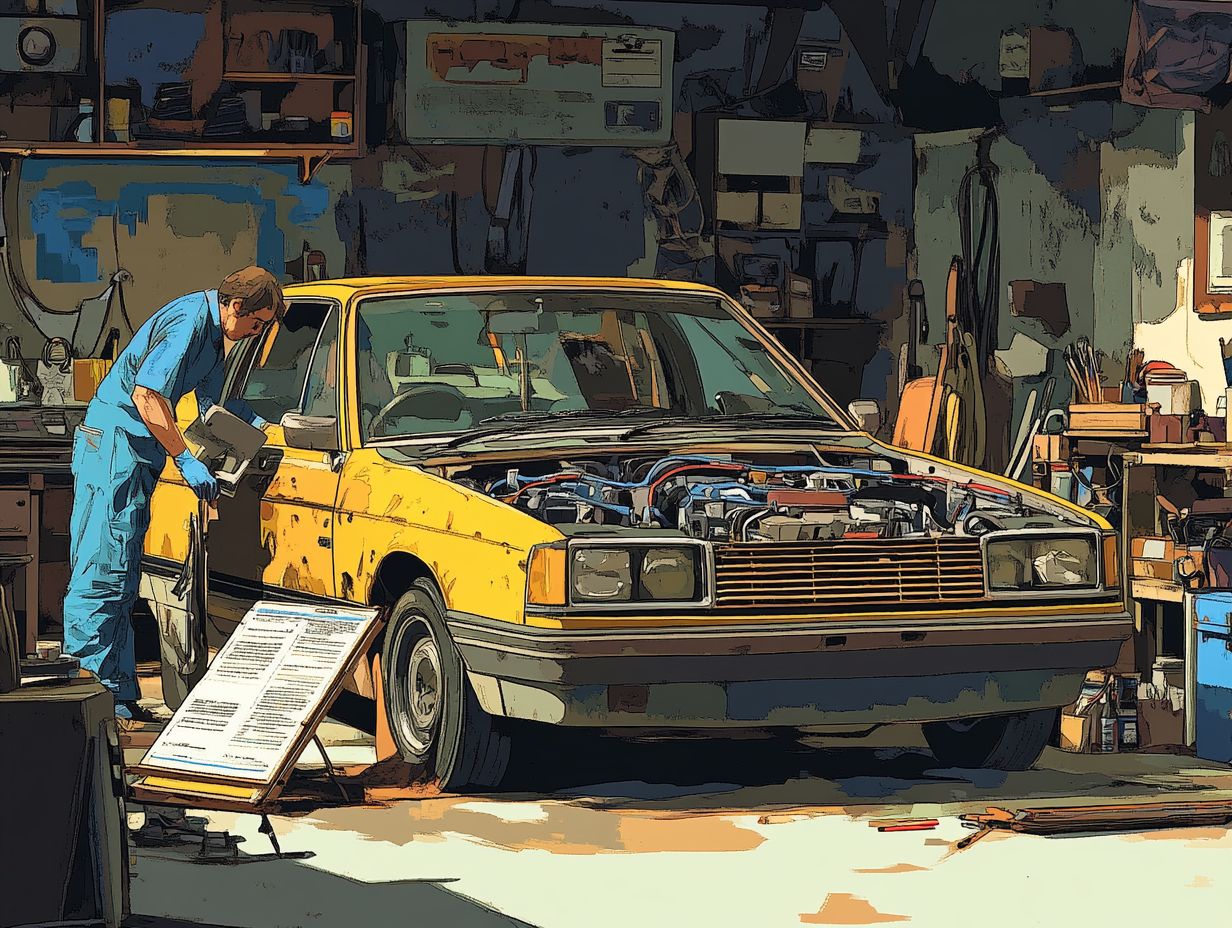
What is considered high mileage for a car?
Generally, a car with over 100,000 miles is considered to have high mileage. However, this can vary depending on the make and model of the car.
How often should I change the oil in a high mileage car?
It’s best to change the oil every 3,000 to 5,000 miles for a high mileage car. This keeps the engine running smoothly and prevents potential damage.
What other fluids should I regularly check and change in a high mileage car?
- Coolant (the liquid that helps keep your engine from overheating)
- Transmission fluid
- Brake fluid
These fluids play a crucial role in keeping your car running smoothly and efficiently.
How can I prevent wear and tear on my high mileage car?
Regular maintenance, such as changing the oil and fluids, can help prevent wear and tear. Drive smart and protect your investment by avoiding harsh braking and acceleration!
Should I use synthetic or conventional oil in a high mileage car?
It’s recommended to use synthetic oil in a high mileage car, as it offers better protection for older engines. However, consult your owner’s manual or a mechanic for specific recommendations.
Is it worth investing in a high mileage car?
It really boils down to how well the car has been taken care of! High mileage cars can still be reliable and cost-effective, but it’s important to consider the maintenance and potential repairs that may be needed in the future.
Don’t wait! Take your car for a check-up or consult a mechanic today to keep it in top shape.
If you have more questions or need tips on car maintenance, feel free to reach out!


